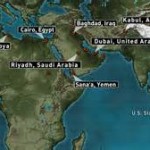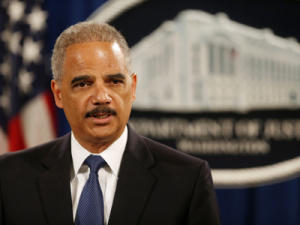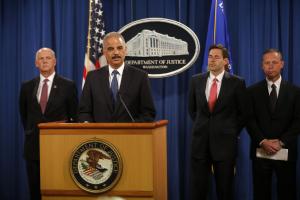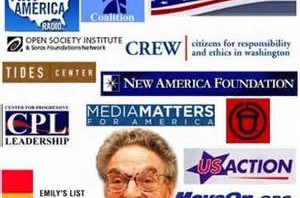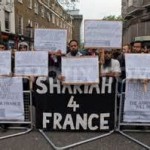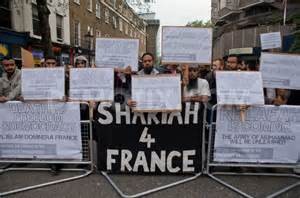So Barack Obama continues to say that al Qaeda leadership has been defeated and the Director of the FBI, James Comey agrees.
Well, we have countless al Qaeda factions all over the globe and they are more bold as we have seen with the kidnapping and killing of young children by Boko Harem in Nigeria. So it defies logic that Comey is stunned to determine that the garden variety attitude in the United States and with the few allies left that is al Qaeda has not been defeated.
Drone strikes abound in Yemen, Somalia and Pakistan dropping hellfire missiles on some high value targets yet, al Qaeda factions like al Nusra, al Shabaab and Boko Harem are still out there. Perhaps James Comey’s name is not on the memo distribution list.
WASHINGTON — When James B. Comey was nominated last June to be director of the F.B.I., it seemed to herald the beginning of a new era at the bureau.
His predecessor, Robert S. Mueller III, began the job just days before the Sept. 11 terrorist attacks, and Mr. Mueller’s years leading the F.B.I. had one overwhelming focus: fighting terrorism. Mr. Comey was appointed a month after President Obama delivered a sweeping speech on the future of the fight against terrorism and said the United States was at a “crossroads” and needed to move off its wartime footing.
As deputy attorney general in the George W. Bush administration, Mr. Comey had questioned the legality of a National Security Agency surveillance program regarded as a major component of the president’s counterterrorism strategy. And given Mr. Comey’s earlier experience in the Justice Department prosecuting gun cases, the F.B.I. seemed likely to shift resources into more traditional criminal prosecutions.
By Mr. Comey’s own account, he also brought to the job a belief, based on news media reports, that the threat from Al Qaeda was diminished. But nine months into his tenure as director, Mr. Comey acknowledges that he underestimated the threat the United States still faces from terrorism.
“I didn’t have anywhere near the appreciation I got after I came into this job just how virulent those affiliates had become,” Mr. Comey said, referring to offshoots of Al Qaeda in Africa and in the Middle East during an interview in his sprawling office on the seventh floor of the J. Edgar Hoover Building. “There are both many more than I appreciated, and they are stronger than I appreciated.”
Based on what he now knows, Mr. Comey said, he is convinced that terrorism should remain the main focus of the Federal Bureau of Investigation. The agency he inherited from Mr. Mueller had roughly half its 16,000 agents and analysts working on national security issues, and Mr. Comey made it clear that he would not be changing those priorities.
In his speech at the National Defense University a year ago, Mr. Obama could also not have been clearer. He said that the United States was entering “a new phase,” and that “we have to recognize that the scale of the threat resembles the types of attacks we faced before 9/11.”
But for his administration, translating that vision has proved difficult. The National Security Agency has resisted demands that it change after its secret surveillance programs were disclosed in documents released by Edward J. Snowden, a former contractor. The C.I.A. has continued to operate a drone program that Mr. Obama said would be transferred to the Pentagon, and it is likely to face renewed criticism when a long-awaited report on its secret prison program is finally released.
Critics say that, at the F.B.I., Mr. Comey has chosen to continue a strategy that is no longer appropriate for the way the terrorist threat has evolved.
“The F.B.I.’s evolution since 9/11 into a domestic intelligence agency is troubling both from a civil liberties standpoint and its effectiveness,” said Mike German, a fellow at the Brennan Center for Justice’s Liberty and National Security program at New York University, “and in the face of evidence that it is ineffective, it’s troubling that Comey would embrace it.”
Mr. Comey’s defenders say he has simply accepted the reality that it still is a dangerous world.
“The problem is that as they have wanted to dial back, the threat has persisted in places like Syria, Yemen and East Africa,” said Rick Nelson, a former senior counterterrorism official with the F.B.I. “There’s still a legitimate threat and we can’t stop what we have been doing and change the model, and that has limited what Comey can do at the F.B.I.”
In briefings with senior administration officials, testimony before Congress and interviews with the news media, Mr. Comey has said that while the United States has “dramatically reduced” the “primary tumor” of Al Qaeda in Afghanistan and Pakistan, “that threat has metastasized” in places like North Africa, Yemen and the United States.
The metaphor has personal meaning for Mr. Comey, who had a malignant tumor removed from his colon eight years ago and whose mother died of cancer. Just as the United States believed it had diminished Al Qaeda in Afghanistan and Pakistan, he said, doctors believed they had defeated his mother’s cancer.
For Mr. Comey and the F.B.I., the Boston Marathon bombings in April 2013 and the scrutiny that followed have illustrated the conundrum the bureau faces 12 and a half years after planes crashed into the World Trade Center and the Pentagon.
After the inspectors general who oversee the American intelligence and law enforcement agencies released a report on whether warning signs had been missed before the bombings, a diverse group of critics seized on its findings, but for different reasons.
Local officials and congressional Republicans criticized the F.B.I. as not having done enough, saying that it should have more closely investigated Tamerlan Tsarnaev, one of the bombing suspects, after he returned to the United States from a 2012 trip to Dagestan. Civil libertarians said that it was the latest example of how the F.B.I.’s traditional approach to terrorism — deploying large numbers of agents to gather information — had failed.
“What we learned in the Boston Marathon bombing is that it wasn’t that the F.B.I. didn’t have enough information — it was drowning in information,” said Carol Rose, the executive director of the Massachusetts A.C.L.U. “If the F.B.I. and the police had done investigative work like they should be doing, they would have looked more closely” at a triple murder in 2011 that the F.B.I. now says Mr. Tsarnaev was involved in, she said.
Critics like Ms. Rose said the bombings exposed a problem that existed before the Sept. 11 attacks: that the F.B.I. needs to better investigate the information it has, not simply collect more of it. They contend that the bureau’s buildup under Mr. Mueller did not solve the problem, but made it worse.
“You had all this information coming in, and nearly all of it wasn’t helpful,” said Mr. German, a former F.B.I. agent, “so agents became accustomed to leads going nowhere and everything they opened became an exercise in how quickly you can close it.”
In the case of the Boston bombing, Russian officials had previously told the F.B.I. that Mr. Tsarnaev had become radicalized and planned to travel to Russia to join underground groups. In their report last month, the inspectors general found that the agent who investigated that lead never questioned Mr. Tsarnaev or his family about his travels, and did not reopen an investigation of him after he returned to the United States.
“The year the F.B.I. investigated the older brother, it said it did 1,000 assessments,” Mr. German said. “There weren’t 1,000 terrorists in Boston that year, and a vast majority of resources were obviously going to things that didn’t matter.”
The F.B.I. has said that it did all it could, given the information it had from the Russian government and the legal restrictions on how it conducts its investigations.
But the bureau’s focus on counterterrorism has led to criticism that a generation of agents have spent their entire careers doing nothing else. Mr. German and other critics say they never learned the basic policing skills needed for a criminal investigation. Mr. Comey hasacknowledged the problem, ordering that the F.B.I.’s newest class of recruits, scheduled to start training in June, spend significant time on criminal investigation squads. And he has given his field offices more power to devote resources to helping local authorities.
He has also spent time studying the cybersecurity issue — which Mr. Mueller has said would be one of his most significant challenges — in an effort to determine how the bureau can be more effective in policing it.
And Mr. Comey said he also wanted to apply the lessons learned in fighting terrorism to fighting other crimes. If Congress approves, he plans to move the bureau’s head of intelligence out of the national security division and create a new intelligence branch that will amass information on crimes like fraud in an effort to more quickly identify trends and perpetrators.
Using another metaphor — this time a football one — Mr. Comey said that he envisioned the F.B.I. as a free safety who has some primary responsibilities but is often called on to help other defenders on the field.
“We have certain assigned defensive responsibilities, those are the national securities ones, but beyond that I want to look to the line of scrimmage, which is the primary line of defense, which is state and local law enforcement and say, ‘O.K. where do you need us to make a tackle?’ ” Mr. Comey said. “ ‘Do you need us to stay deep, do you need us to cover over the middle, do you need us to come up and play run support?’ And that’s very different in each game with each opponent.”
If Mr. Comey has not changed Mr. Mueller’s policies, he has brought a distinctly different style to the bureau, devoting much of his time to raising morale, which had sagged because of Mr. Mueller’s demanding approach to management as well as budget cuts ordered by Congress.
While both had a background as federal prosecutors, Mr. Mueller was a prep school and Princeton graduate who wore a white shirt nearly every day as director and stipulated that agents keep their coats on at meetings. Mr. Comey, a less intimidating figure despite being 6-foot-8, struck a more casual note with a blue shirt on his first day as director and has gone out of his way to personally connect with his agents.
He has vowed to visit every one of the 56 field offices in his first year as director, and on a recent visit to the Buffalo office explained his theory that a more informal F.B.I. might be a more effective one.
“My first day everyone showed up and everyone was dressed up looking beautiful,” he said “And I said, ‘Listen, I don’t want people for their regular staff meetings with me wearing jackets because I worry that physical buttoning-up leads to a metaphysical buttoning-up.’ ”

